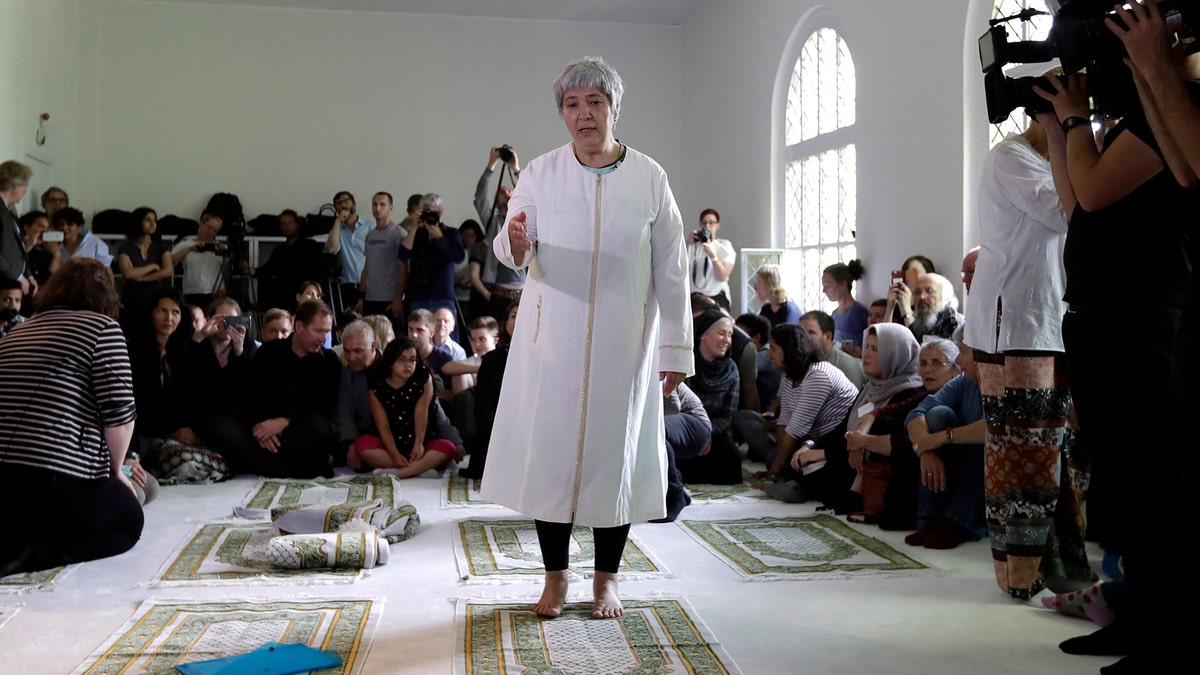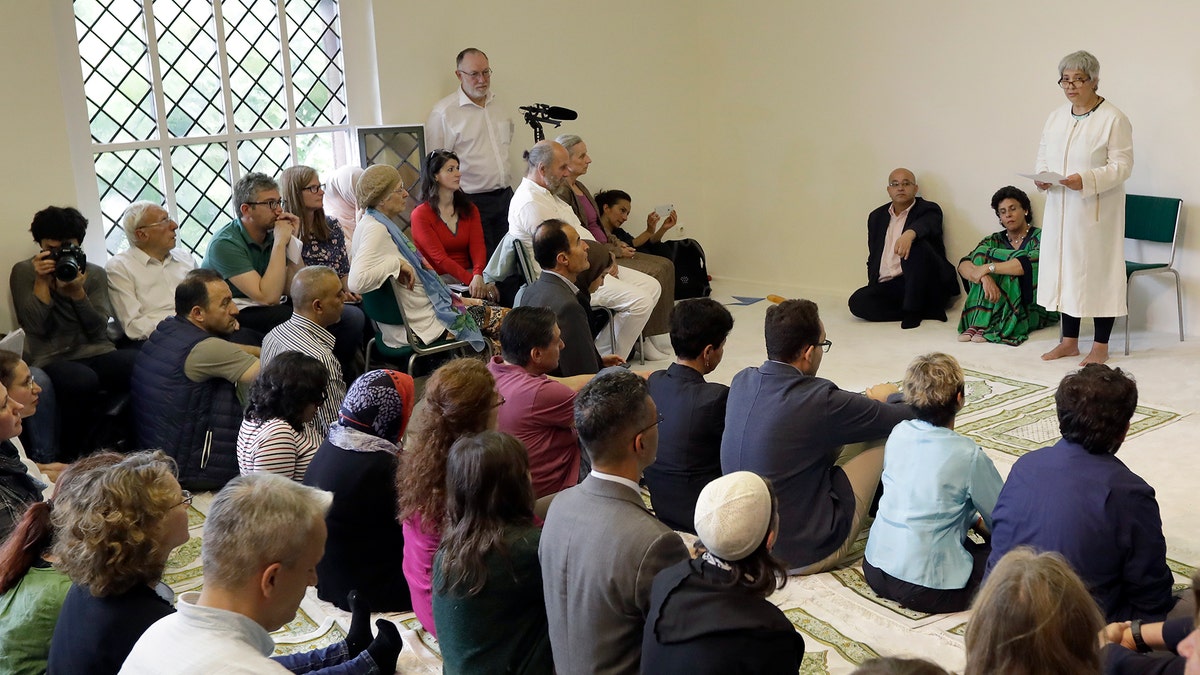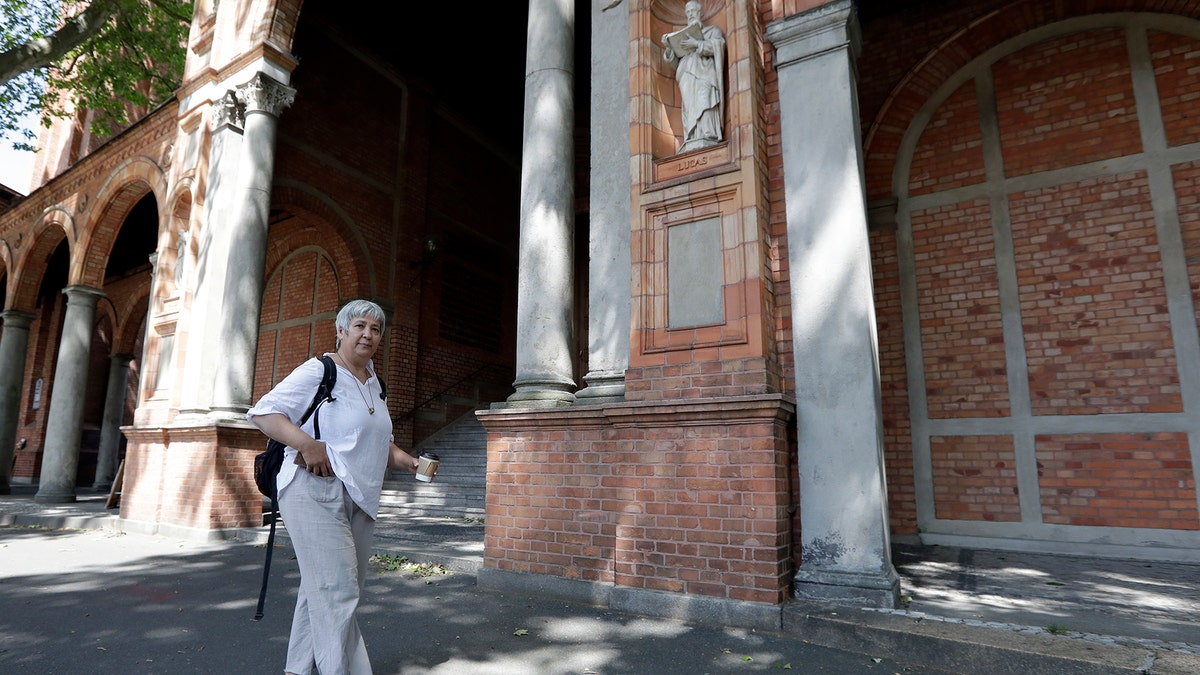
Seyran Ates, standing at center, founder of the Ibn-Rushd-Goethe-Mosque gestures during the opening of the mosque in Berlin, Germany, Friday, June 16, 2017. (AP)
Seyran Ates has gotten used to the hundreds of threats she receives daily.
“She is the devil,” they say. “She should burn in hell.”
Since founding a liberal and controversial mosque in Berlin last month, Ates has been constantly targeted by those who have a strict interpretation of Islamic law. She vows to fight for religious freedom and challenge radical Islam – even if it puts her life in danger.
German authorities are taking the threats seriously. Six policemen guard her around the clock.
The mosque is open to Sunni, Shia, and other interpretations of Islam. It also welcomes gays. The burka and niqab are forbidden. Women may lead prayer services, and men and women sit together, which violates traditional Sharia law that requires men and women to pray separately and prohibits women from becoming imams.
GERMANY OPENS ITS FIRST LIBERAL MOSQUE IN BERLIN
The Rushd-Goethe Mosque, named after a Muslim philosopher and a German writer fascinated by Middle Eastern poetry, is housed in a building on the property of a Protestant church in Berlin’s Moabit District.
Ates, 54, a Turkish-born German attorney, defies the condemnations issued by Turkish and Egyptian religious authorities. Dyanet, the Turkish authority, condemns the new mosque as depraving and ruining religion. Egypt’s state-run religious authority issued a fatwa condemning the mixing of the sexes during prayer as a violation of Islam.

Ates a daughter of Turkish immigrants founded the first liberal mosque in Germany where men and women can pray together, homosexuals are welcome and Muslims of all sects can leave their inner-religious conflicts behind. (AP)
Yet Ates is willing to risk her life to chart a new path for Muslims.
GERMANY REJECTS TURKISH OFFICE'S CRITICISM OF LIBERAL MOSQUE
“We have the responsibility to show that we do not agree with Muslims who commit violence,” she said during a phone interview. “We have to stand up and fight for the peace side of our religion.”
She said she has repeatedly called for dialogue within Germany’s predominantly conservative Muslim community of 4.5 million. Her voice grew sad as she recalled the response.
“They shouted that they have to kill me… to rape me,” she said. “These are their messages.”
While many condemn Ates, the German government strongly backs her.

AP (Seyran Ates said she's standing up for the peace side of her religion.)
Harald Neymanns, a spokesman for the Ministry of the Interior, made it clear that freedom of religion is enshrined in the German constitution and will be defended. The volatile situation at the mosque is being monitored to ensure safety at the Friday night services, he said.
The Ministry of the Interior has a responsibility to uphold the constitutional right to freedom of religion.
Deidre Berger, director of the American Jewish Committee office in Berlin, also condemned the death threats.
“The defamatory attacks are attempts by Turkish and Egyptian national religious authorities to crush newer forms of religious expression that bridge tradition with democratic values of equality,” she said in an email.
Berger also said the resistance to the new mosque in Berlin shows that reformers like Ates face a daunting task in their attempt to create greater compatibility between Islam and European values. If the new mosque fails, she said, this would tear at the fabric of religious freedom – which is a core western values.
But a new report by the German government shows that those who advocate for a broader interpretation of Islam have increasingly come under attack. The government’s domestic intelligence agency, or the BIV, reports a rise in the number of Muslim fundamentalists, from 8,350 in 2015 to 10,100 in 2016. These militant Muslims oppose any liberalization of Islam and increase the chance for terrorist attacks in Germany, according to the report, which also disclosed a rise in attacks by Islamic extremists over the same time period.
Norwegian author, Birgitte H. Huitfeldt, interviewed feminists in the region for her new book, “Uncensored,” which was recently published in Germany. She found that there has been little change in the perception of women in Middle Eastern societies, with similar perceptions prevalent among Muslims in Germany.
“It was difficult to distinguish between Islamic fundamentalism and everyday oppressing family codes, or patriarchal suppression of women,” Huitfeldt writes.
Despite the uphill fight, Ates, nevertheless, remains resilient.
She recalled her early struggles during our 2007 interview in a Berlin safe house. Her brother and father beat her and prevented her from leaving their tiny apartment unaccompanied. She escaped this oppressive environment when she was 17 and ran away to live in a women’s shelter with battered Turkish and German women.
In 1984, she was badly wounded when Turkish nationalists invaded the shelter, guns blazing, killing the woman next to her. It took her five years to recover from the wounds and psychological trauma. She continued her education and became a lawyer, often representing Muslim women in divorce cases. One of the husbands attacked her outside a courthouse.
Ates said she is not intimidated by the death threats and plans to continue pushing the limits.
“The pushback I am getting makes me feel that I am doing the right thing,” she said. “God is loving and merciful, otherwise he would not have turned me into the person I am.”
